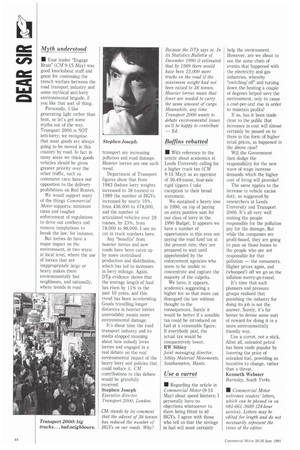Myth understood
Page 46

If you've noticed an error in this article please click here to report it so we can fix it.
• Your leader "Engage Brain" (CM 9-15 May) was good knockabout stuff and great for continuing the trench warfare between the road transport industry and some mythical anti-lorry environmental brigade, if you like that sort of thing.
Personally, I like generating light rather than heat, so let's get some myths out of the way. Transport 2000 is NOT anti-lorry; we recognise that most goods are always going to be moved in this country by road. In fact in many areas we think goods vehicles should be given greater priority over the other traffic, such as commuter cars; hence our opposition to the delivery prohibitions on Red Routes.
We would support many of the things Commercial Motor supports: minimum rates and tougher enforcement of regulations to drive out cowboys and remove temptations to break the law, for instance.
But lorries do have a major impact on the environment, in two ways: at local level, where the use of lorries that are inappropriately large or heavy makes them environmentally bad neighbours, and nationally, where trends in road transport are increasing pollution and road damage. Heavier lorries are one such trend.
Department of Transport figures show that from 1983 (before lorry weights increased to 38 tonnes) to 1989 the number of HGVs increased by nearly 10%, from 436,000 to 478,000, and the number of articulated vehicles over 28 tonnes, by 23%, from 78,000 to 96,000. I see no cut in truck numbers here.
Any "benefits" from heavier lorries and new roads have been eaten up by more centralised production and distribution, which has led to increases in lorry mileage. Again, DTp evidence shows that the average length of haul has risen by 11% in the past 10 years, and this trend has been accelerating. Goods travelling longer distances in heavier lorries unavoidably means more environmental damage.
It's about time the road transport industry and its media stopped moaning about how nobody loves lorries and engaged in a real debate on the real environmental impact of the heavy lorry and policies that could reduce it. CM contributions to this debate would be gratefully received.
Stephen Joseph
Executive director, Transport 2000, London. Because the DTP says so. In its Statistics Bulletin of December 1990 it estimated that by 1989 there would have been 12,000 more trucks on the road if the maximum weight had not been raised to 38 tonnes. Heavier lorries mean that fewer are needed to carry the same amount of cargo. Meanwhile, any time Transport 2000 wants to debate environmental issues we'll be happy to contribute ---Ed.
























































































